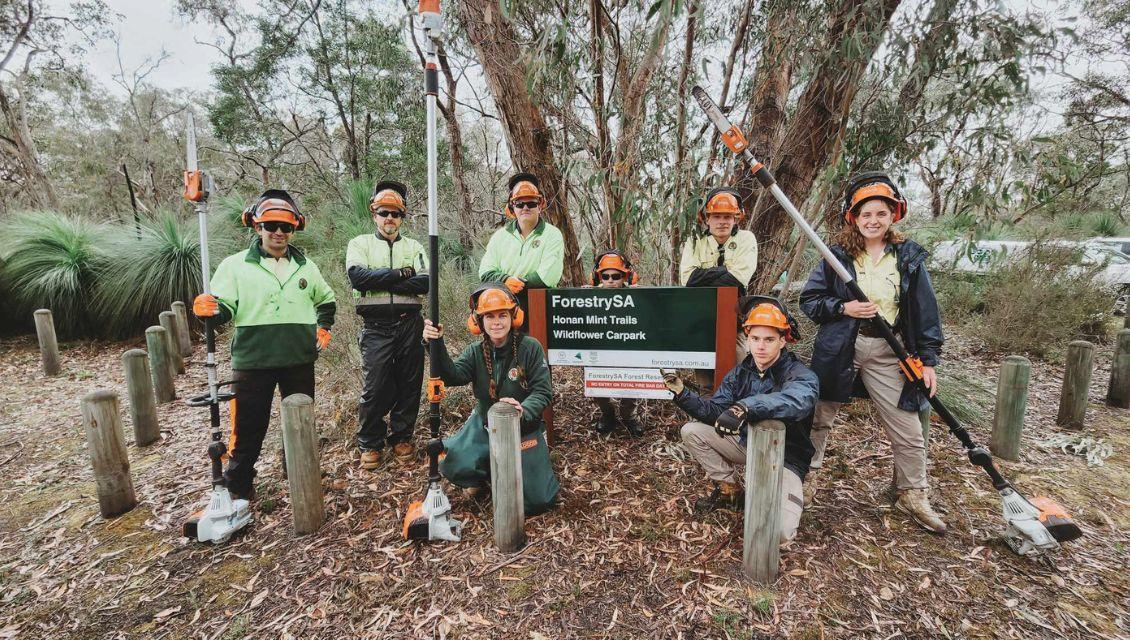
A day in the life of a park ranger
No two days are the same for Lower Limestone Coast (Robe) Park Ranger Emma Blythman, and that’s exactly why she loves her job.
On any given day in the state’s spectacular South-East she could be dealing with invasive pests in the morning, monitoring native species at lunch and helping Park customers in the afternoon.
“I enjoy every facet of my role,” Emma says.
“It’s a nice feeling to be proud to put on my ranger uniform and look forward to going to work each day.
“I would have to say my favourite part of the role is working outside in nature and protecting our beautiful national parks, including the plants and animals that call them home.”

Growing up in McLaren Vale, Emma completed a Bachelor of Business after finishing high school, but says she always suspected that her love of nature and the outdoors would set the course of her career path.
“I have always felt very connected to nature and once I finished my degree, I spent my twenties travelling and working in various countries overseas,” she says.
“The more I saw of the world the more my love for nature and my desire to protect it grew, and I knew when I returned to Australia that I wanted to dedicate my career to protecting the environment.”
In 2018 Emma started working at Uluru-Kata Tjuta National Park in the Northern Territory, firstly as a visitor services officer working at the Cultural Centre Information Desk before being promoted to a project officer role working in the Joint Management department between Traditional Owners and the Federal Government.
“When I moved back to South Australia in 2021, I worked as a project firefighter at Cleland in the Adelaide Hills for the National Parks and Wildlife Service before obtaining a ranger position at Dhilba Guuranda – Innes National Park on the Yorke Peninsula and now finally a ranger role at Little Dip Conservation Park in Robe,” Emma says.
The traditional home of the Bunganditj and Meintangk people, Little Dip – south of Robe — features a ruggedly beautiful coastline and a number of small lakes.
It’s about as picturesque an “office” as you could hope for, but Emma says ranger life is not without its challenges.
“These can differ depending on the location of the park, but I would say for our coastal parks the biggest challenges we face are people camping illegally in the dunes and beaches, bringing their dogs into the park, having fires in fire ban season, leaving rubbish behind, driving off track and the disturbance to beach nesting shorebirds from 4WDs,” she says.
“These compliance issues along our coastlines are causing damage to our vegetation and dune systems and also compromising the conservation of our native wildlife.
“Consistent education and compliance from rangers helps protect the biodiversity of our parks and preserve them for future generations to come and enjoy.”
Emma says she knew very little about the Robe region before moving there, but now openly admits that she has fallen in love with the area.
And she has big plans for her time at Little Dip Conservation Park.
“While I’m located here, I would like to get the park to a point where we are not just rectifying the maintenance and misuse issues but progressing it even further in terms of natural resource management,” she says.
For young people thinking about pursuing the role of park ranger as their career, Emma says there are many avenues – but warns that it’s a competitive field.
“I would suggest people get as much experience as possible, and a great way to gain this experience is to volunteer either through local Friends of Parks groups, or by applying to become a volunteer ranger through the Department’s volunteer ranger program,” she says.
“Most ranger positions require a degree, but not always. If considering study, then Environmental Science of Conservation and Land Management degrees are very helpful.

“Lastly, firefighting is a highly regarded skill in the department. You could consider becoming a volunteer through your local Country Fire Service or apply to become a Project Firefighter for the Department for Environment and Water. Many people become rangers through this employment stream.”
Emma says she’s proud to be playing a role in protecting our wild areas and helping to educate people about the importance of nature.
“National parks are so important for protecting the biodiversity and ecosystems of the region,” she says.
“Most land is now utilised for human advantage, whether it be housing or farming, and little natural vegetation remains for wildlife and plants.
“Without these we would be in a lot of trouble, so it’s important to preserve it. It is also a place where humans can come and reconnect with and enjoy nature.”
This story was originally published on the We Are SA website.